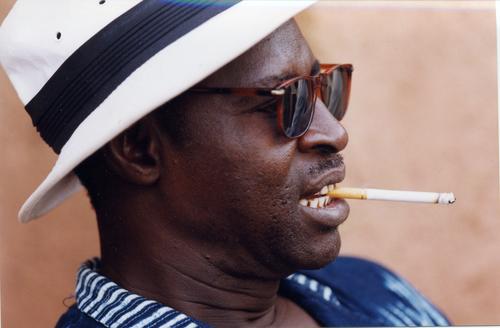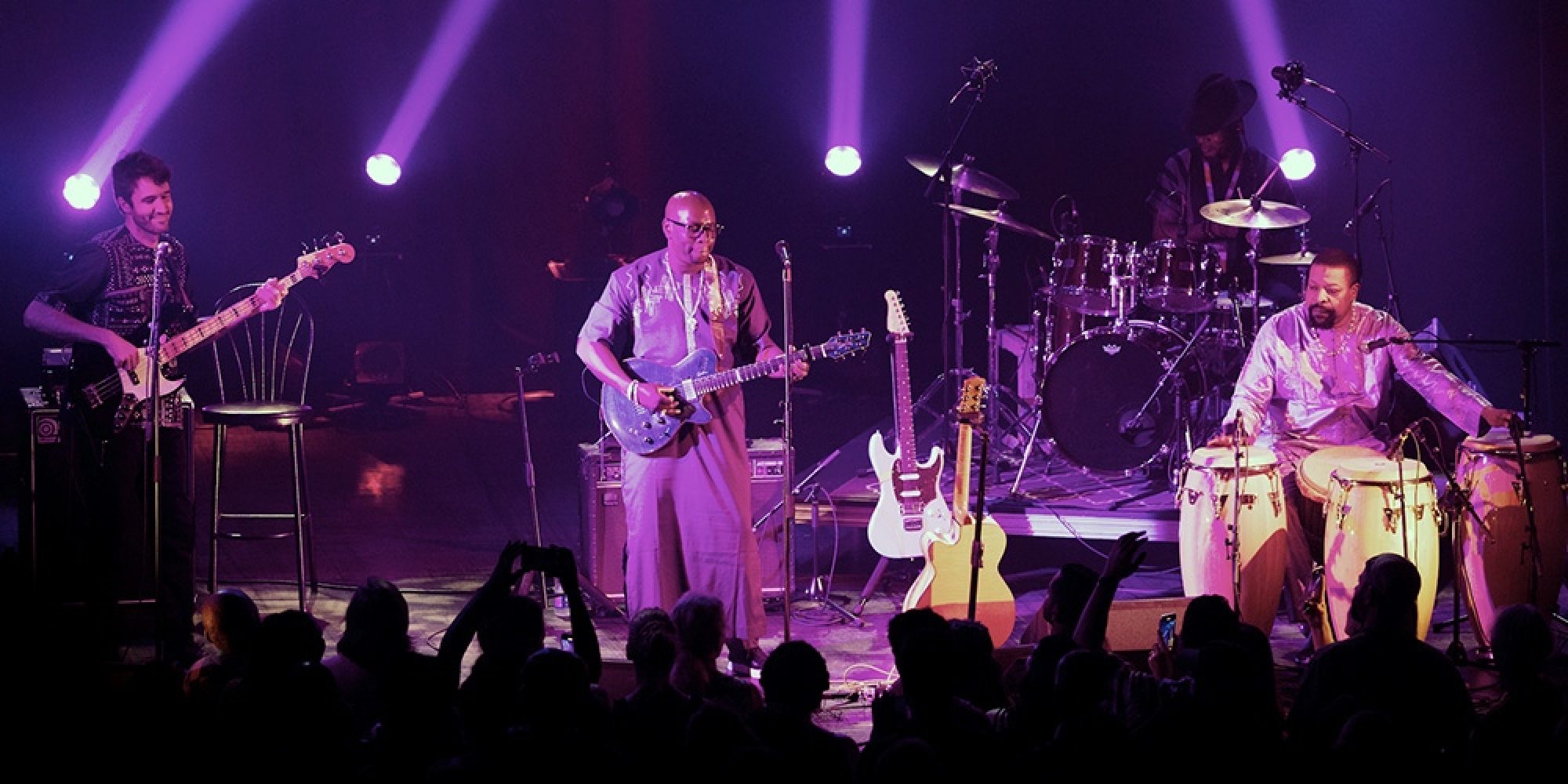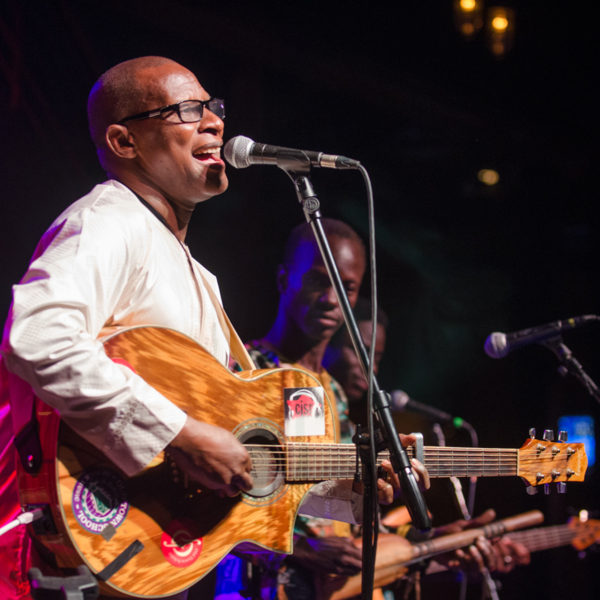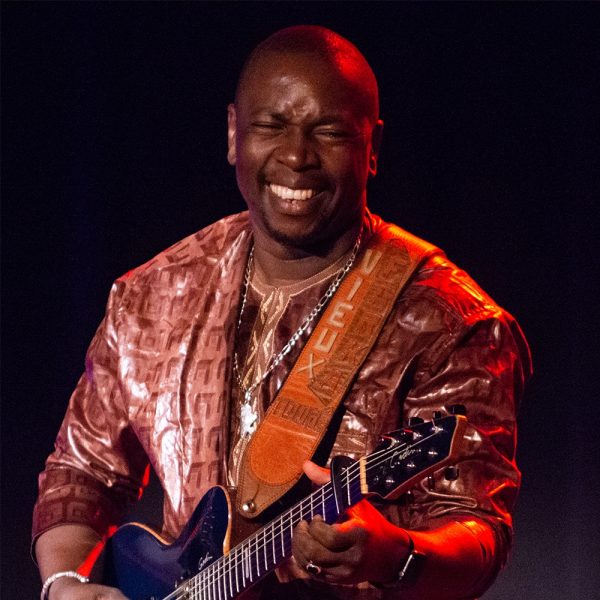Photos by Frédérique Ménard-Aubin
In June 2022, for the first time Vieux Farka Touré released the album, Les Racines, of music by his father, Ali Farka Touré. As he told Banning Eyre in an interview at the time of the release:
“I decided early on not to do the same thing as him, but to be myself. This has always been a bit complicated for me. Because Ali is Ali, with his Grammys and all. He's the top. So I decided right away that I wasn't simply going to follow him. I had to let the world discover what I do, what I love, who I am, what I can do. So I have done quite a lot of that. Now, I've arrived at a moment where I said, "I've done all that. People know that Vieux is a bit in rock, a bit in reggae, a bit in pop.” All of that. Many projects. But now I thought it's time to go back home, to reclaim the source, the basis of my music, where I was born, where I grew up, to bring in all of that. And above all, to bring in what Ali gave me as a heritage. It is all of that you hear in this music. On this album, I try to show what Ali gave me.”
A few months later in September, Touré released a second album of this father's material, but this time in collaboration with the Texas psych-pop group Khruangbin. Both albums were well received. We were set to interview Touré at the Festival de Jazz de Montreal last year, but apparently, there were some problems at the border and so he was unable to play at the festival, nor do the interview with us.
But all that was straightened out this year and so we not only had a chance to see Touré perform at a sold out show at Club Soda during this year's festival, but we had some time to sit and catch up with him beforehand.
The interview has been edited for clarity and length.
RON DEUTSCH: How are you?
VIEUX FARKA TOURÉ: Yeah, I'm good. I'm good.
I was very sad we were unable to get together last year. There were some problems for you getting here then.
Yeah. Some problems getting visa and stuff, but it's, you know, it's like now almost impossible to have visa to come to Canada.
So the last time you talked to Banning was when Les Racines came out, the first album you did to go back and really explore your father's repertoire.
Yeah, you know sometime when are you doing music, I think you have also this time, to look a little back, and to take it another level, another departure.
But we didn't we didn't get to talk then about your recording the other album, Ali, which you did with Khruangbin. How did that come about? Did they reach out to you or did you reach out to them?
It was actually me. I would like to bring something nice for my father's music. And also, you know, to let this generation know who Ali Farka was – to bring this music to another level, to a new generation. And because the people love Khruangbin, I thought they would be good ones. But we looked at many people, but then I said “Okay, let's do this.”
So it was just all very smooth.
Yeah. It was really when I met them. My friend, my manager, Eric Herman, he said, “Okay, maybe you can meet them in England.” And we did, you know, to see how they are. Because for us, it's not only just to make music, it's also the connection with the people, musicians. How the people are? I don't like it when the people are like, you know, “we are superstars.” They were not like this. They're very cool, very nice. So we thought that they were the best – good guys and stuff. And that's how things came about.
And when you heard their music for the first time, did you hear something that connected you to your own music and/or your father's music?
The guitar player, he has a little bit of African, how do you say? Vibes. Yes, African vibes in his way when he plays and in what they do, so it's good.
And then how did you proceed on the recording? Did you come to the States, or did they come there?
I came to the States in Texas. They're in Houston. We didn't do rehearsal, we didn't do anything. They said they would like to rehearse, but I said, "No. We're just going do what comes from the heart. So we don't have to rehearse. Just jump in and play.”
Did you send them the songs that you wanted to do?
No, I just went there, sat all in the same room and we started to play. It's just, you know, we did show them this is how we play and this is the song.
So you just kind of worked out the arrangement in the studio?
And after, you know, we put some stuff, but it all was recording at the same time, live, without rehearsal.
And you've done some touring together?
In the United States. We're already doing this. We're doing some shows with them.
You've done other collaborations in the past as well, do you see yourself doing another collaboration again soon?
I want to do some collaborations, for sure. We never know. I want to have maybe another side like jazz, blues or something like this. We've just been recorded with Roberto Fonseca. But we've been waiting to see what we're going to do with that.
Is it some of your musicians and some of his?
Yes, in Mali. He had two musicians and I have two musicians. So, we did like a good mix between African music and Cuban. We're gonna do very nice things, but I think we have to wait to see what it's going to be.
Anything else to report?
Yeah, I've been recording just a little bit of live stuff in Australia, so we're gonna check that stuff out and do a live album. But we're doing it in the studio. We play it all the live in the studio.
And how are things back home?
In three weeks, I going to be home, but just for one week, three days or some time. But in the country, yes, there's still problems. But you know how we say, “It is what it is.” But we just cross fingers to see if it's gonna be better. But it's very difficult for the people now.
I will cross my fingers as well. It's been a pleasure as always and have a good show tonight.
Merci.
Related Audio Programs












